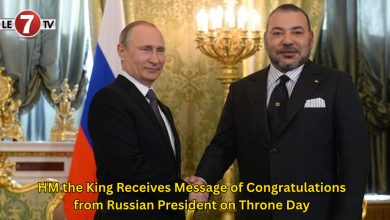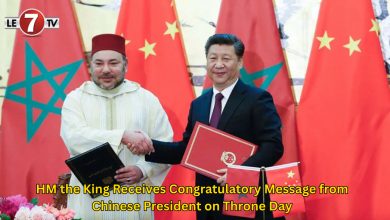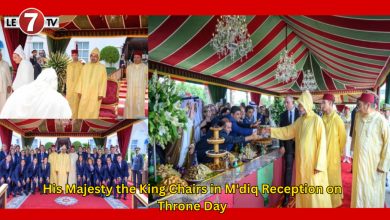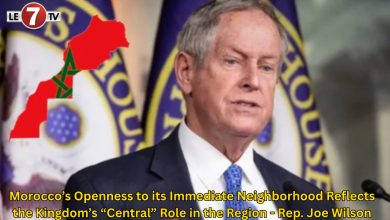Washington Seriously Considering Moving AFRICOM Headquarters to Morocco — A Strategic Partner and Regional Security Pillar
Morocco continues to assert itself as a key player in African security. During a hearing held on June 10, 2025, before the U.S. House Armed Services Committee, General Michael E. Langley, commander of United States Africa Command (AFRICOM), highlighted the Kingdom’s central role in regional stability and did not rule out the possibility of relocating AFRICOM’s headquarters from Stuttgart, Germany, to Morocco. While budgetary concerns still pose a hurdle, the Moroccan option is gaining significant traction within U.S. strategic circles.
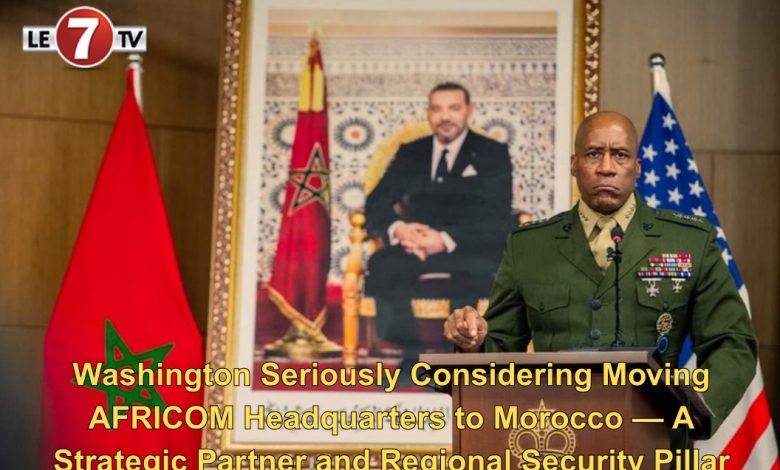
A Strategic Repositioning Under Review
The idea of moving AFRICOM’s headquarters to Morocco is no longer just a fringe concept. In Washington, this scenario is now being seriously debated at the highest levels. Before Congress members, General Langley acknowledged that Morocco presents a prime geostrategic location for leading U.S. operations across the African continent, citing the country’s stability, growing military capabilities, and active regional security engagement.
Although the financial cost of such a move remains high, Langley noted that the operational benefits could ultimately outweigh the current budgetary constraints. He emphasized Morocco’s proximity to crisis zones in the Sahel and its access to both the Atlantic Ocean and the Mediterranean, positioning it as a key partner for the United States.
Morocco: A Regional Model and Security Exporter
More than just a traditional ally, Morocco was described by Langley as a true “security exporter,” praised for its ability to train thousands of African military personnel each year in fields such as military medicine, intelligence, special forces, and airborne troops. Thanks to exemplary cooperation, over 1,200 officers from sub-Saharan African countries are trained annually in Morocco—often at no cost to the recipients.
The Royal Armed Forces, supported by a fleet of U.S.-provided C-130 aircraft, also conduct training and logistical support missions in the region. This structural role is complemented by active participation in UN peacekeeping missions, with more than 1,700 Moroccan troops deployed, particularly in the Central African Republic and the Democratic Republic of the Congo.
A U.S.-Co-Financed Center of Excellence in 2025
General Langley also announced a major milestone: in September 2025, Morocco will inaugurate a Peacekeeping Center of Excellence. This state-of-the-art facility, partially funded by the United States, will be capable of training thousands of African military personnel and hosting high-level summits, defense conferences, and elite military training sessions. It is set to become a powerful tool for enhancing the capabilities of African armed forces.
African Lion: Symbol of Deepened Military Cooperation
Langley referenced his recent participation in African Lion 2025, held in Morocco—the largest joint military exercise organized by the U.S. on the African continent. The event brought together over 10,000 troops from 52 countries, including several NATO members. He described it as a testament to the effectiveness of a partnership in which African nations—led by Morocco—play a central role in addressing regional threats.
He also noted the recent Africa Senior Enlisted Leader Conference held in Rabat, which gathered more than 130 senior military officials from 30 African countries. The presence of Sergeant Major Michael Woods, Langley’s former senior advisor, in Morocco for the event further illustrates, according to the general, “where strategic influence on the continent is currently the strongest.”
Acknowledging Morocco’s Leadership
In summary, General Langley’s statements painted a glowing picture of Morocco: a model of military cooperation, security projection, regional diplomacy, and African officer training. He called the Kingdom “a shining example of return on investment” for the United States.
While the relocation of AFRICOM to Morocco has not yet been finalized, it is now a very serious consideration in Washington, especially as Morocco’s security influence—particularly in the Sahel—continues to grow.
With its unwavering commitment to peace and stability, Morocco could soon host one of the most important U.S. military commands outside American soil—an unprecedented recognition of its status as a major strategic partner on the African continent.
Editorial team/le7tv





